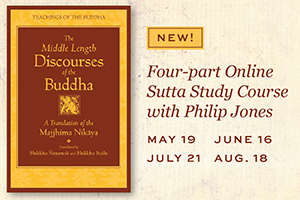
When I first began exploring Insight Meditation it was fairly simple. I just tried to practice the way my teachers told me to practice. But after I had practiced for a few years I began to notice that some well-known, highly regarded teachers would say “Practice this way” while other well-known, highly-regarded teachers would sometimes say “Practice that way.” It could be confusing.
Sometimes a teacher would say in a talk “The Buddha said …” and I would find it so inspiring that I would ask for a written version or where I might find it. But then, many times, I would look for the quote and find something quite different from what I had been told the Buddha said. Of course I came to understand that there were differences in translations, but it did make me wonder how one version could be so very different from another.
So in time I began trying to read a few suttas, the discourses of the Buddha that had been preserved in the Pali language and more recently translated into English. For some time it was often difficult. Sometimes I didn’t understand the concepts. Sometimes the teachings seemed too abstract, lacking in the experiential detail that I found helpful. But I also began gravitating to teachers who were more steeped in the suttas. I learned from them about reading and studying the suttas and using the suttas as a guide for one’s own practice. After a number of years of this the suttas have become a very important part of my life and practice.
Now I try to read with a few questions in mind:
What does this sentence or paragraph mean, in terms of the teachings and in terms of my own practice? If a word or phrase is troubling in some way, I’ll look at another translation to see if it offers a different view.
If the translator offers an explanation, does it make sense to me given the words in the text?
If there is a simile or metaphor, in what way might it be pointing to the experience of the practices in this sutta?
When a sutta is addressed to bhikkhus and bhikkhunis (male and female Buddhist monastics), in what way might it also speak to a householder like myself?
How do my own practice and my intentions for practicing align with what I find in this sutta? If there’s a gap how might I adjust my own practice to align with this?
I am not a scholar of the discourses, but in recent years I’ve begun sharing with others my love for the discourses and the approach to them that I find helpful. In January Mid America Dharma and I began offering Bringing Sutta Study Into Your Practice: An Online Introduction, a three session course. In May we’ll be offering Reading The Middle Length Discourses of the Buddha: An Online Sutta Study Course.
If you have questions or an interest in participating in a sutta study course, you can contact Phil at comodharma@gmail.com.
Back to Spring 2021 Newsletter
.